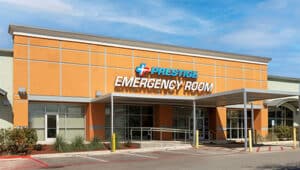Severe vomiting and diarrhea can quickly go from an uncomfortable illness to a dangerous medical situation. It’s important to understand the signs and know when to seek help.
Understanding what causes severe diarrhea and vomiting, recognizing severe dehydration symptoms, and knowing when to go to the ER for dehydration can help you protect yourself or your child.
What Causes Severe Vomiting and Diarrhea?
Severe vomiting and diarrhea can have many causes, including:
- Infections from bacteria, parasites, or viruses.
- Food poisoning from contaminated food.
- Certain medications (e.g., antibiotics).
- Underlying health conditions (e.g., stress, anxiety).
- Over- or under-eating.
- Bowel obstruction or inflammation.
Knowing the cause can help guide how to treat severe vomiting and diarrhea safely at home or whether you need to seek medical care.
When Do Symptoms Become Dangerous?
Typically, vomiting and diarrhea can be safely managed at home. However, seek emergency medical care if these symptoms are accompanied by one or more of the following:
| Adults | Infants and Children |
| Signs of severe dehydration | Signs of severe dehydration |
| Diarrhea lasting two or more days. | Diarrhea that does not improve after 24 hours. |
| Fever over 102°F | Fever over 102°F |
| Blood in vomit or stool | Blood in vomit or stool |
| Severe abdominal pain | Severe pain |
If you’re unsure whether you or your child’s vomiting or diarrhea is a medical emergency, it’s best to consult a doctor or seek urgent medical care.
Dehydration: The Silent Risk
According to the Mayo Clinic, vomiting and diarrhea can quickly lead to dehydration. This is because your body loses essential fluids and electrolytes faster than they can be replaced. If left untreated, this can lead to severe and potentially life-threatening symptoms.
Signs of Severe Dehydration to Watch For
Adults
- Excessive thirst.
- Dry mouth.
- Little or no urination.
- Dark-colored urine.
- Severe weakness.
- Dizziness or lightheadedness.
Infants and children
- No wet diaper for three or more hours.
- Dry mouth and tongue.
- Crying without tears.
- Sunken appearance (abdomen, eyes, or cheeks).
- Unusually sleepy or unresponsive.
- Skin that doesn’t flatten when pinched.
Symptoms in Adults vs. Elderly Patients
While typical signs of dehydration are often easy to spot in adults and children, they can be more subtle in elderly patients. Silent but severe dehydration symptoms in older adults may include:
- Confusion or disorientation.
- Low blood pressure or fainting.
- Rapid heartbeat.
- Dry skin or lips.
- Reduced sweating.
Knowing what to do for severe vomiting and diarrhea and how to recognize dehydration emergency signs early is critical.
When to Seek Emergency Care
Is vomiting and diarrhea a medical emergency? Not always, but persistent symptoms that prevent fluid intake or produce blood in vomit or stool require immediate medical attention.
Dehydration from vomiting and diarrhea that doesn’t improve with at-home care, causes severe abdominal pain, or shows signs of severe dehydration should be assessed immediately in an emergency room.
Parents of infants and young children must be especially vigilant. Knowing when to go to the hospital for diarrhea or when to go to the ER for vomiting can prevent more serious complications.
Home versus ER: Making the Right Call
Most cases of vomiting and diarrhea can be managed at home with fluids, rest, and small meals. However, if you notice one or more of the following, seek emergency care to prevent complications:
- Inability to keep fluids down.
- Blood in vomit or stool.
- High fever.
- Severe abdominal pain.
- Severe dehydration symptoms.
According to the Mayo Clinic, higher fevers may signal more severe dehydration, especially when prolonged diarrhea and vomiting are present.
How Dehydration Is Treated in the ER
At Prestige ER, emergency treatment for dehydration from vomiting and diarrhea typically includes IV fluids and electrolyte replacement to restore hydration quickly.
Our ER physicians will monitor your or your child’s vital signs and may run certain lab tests to ensure there are no additional complications.
After treatment, we recommend continued oral hydration and plenty of rest to support a full recovery.
Recovery Tips After Emergency Treatment
After ER treatment for dehydration, we recommend you:
- Rehydrate with water or sugar-free electrolyte drinks.
- Rest, rest, rest.
- Eat small, easy-to-digest meals.
- Watch for returning symptoms and seek follow-up care if needed.
Preventing Severe Dehydration at Home
Mild to moderate cases of vomiting and diarrhea can often be managed safely at home with oral rehydration, careful monitoring, and small, frequent sips of water. It’s best to avoid sugary, caffeinated, or salty drinks.
If symptoms get worse or home remedies don’t work, seek immediate emergency care to avoid dangerous complications of severe dehydration.
Why Choose Prestige ER for Emergency Dehydration Care
Prestige ER provides fast, expert treatment for adults, children, and infants experiencing vomiting and diarrhea. Our emergency room services include:
- Immediate access to IV treatment and labs.
- Board-certified ER physicians on-site 24/7.
- Safe, fast, and compassionate care close to home.
Visit your nearest location for fast, compassionate care.












